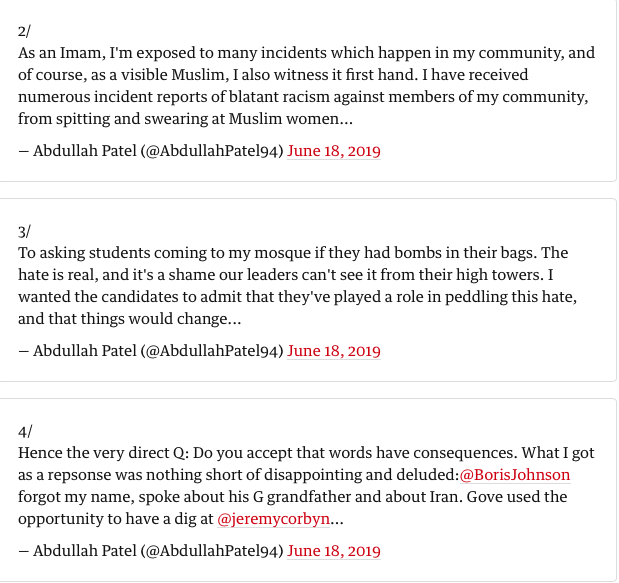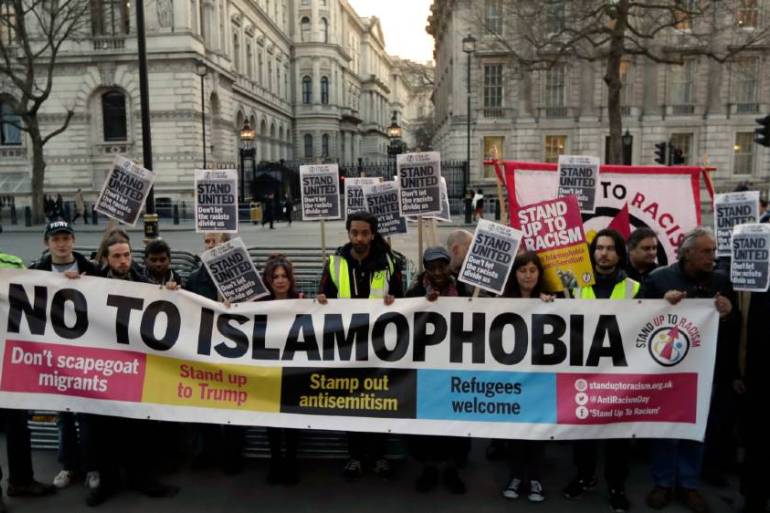The Conservative party has long faced criticism over its failure to tackle Islamophobia within the organisation, with allegations being made against senior and prominent politicians in the party such as Boris Johnson and Michal Gove. In 2018, the Muslim Council of Britain called for an independent inquiry into the problem. Citing nine cases of anti-Islam sentiment from individual Conservative party politicians, they urged that this was in fact “the tip of the iceberg”, and Islamophobia had “poisoned” sections of the party1. The call for an inquiry was further backed by 350 mosques and eleven umbrella organisations across the United Kingdom. Founding members of the Conservative Muslim Forum, such as Baroness Warsi, Baron Mohamed Sheikh and Mohammed Amin, also strongly backed the call for an inquiry.
Three years on from this call however, further criticisms have arisen over the demonstrations of commitment the Conservatives have shown towards the issue of tackling Islamophobia within the party2.
The Conservative Party Debate
A year after the call from the Muslim Council of Britain, and prior to the 2019 UK General Election, Islamophobia became a prominent topic amongst the Conservative party leadership candidates. During a live television debate, Boris Johnson, Jeremy Hunt, Michael Gove, Sajid Javid, and Rory Stewart, each committed to commissioning an independent investigation into Islamophobia should they be successful in becoming party leader. Sajid Javid, himself a Muslim, had previously called for such action to be taken and stressed that “there was a concern [about] growing anti-Muslim hatred in our country, certainly over the last few years, in all parts of society. And, wherever that is, including in political parties, it must be absolutely rooted out”3. Although a spokesperson for Javid’s campaign further stated that whilst Said is concerned about rising divisions and Islamophobia, “he does not have any reason to believe there is anything endemic in the Tory party” that breeds it4.
Audience responses to the debate however, were far from convinced about the sincerity of the politicians commitments. After the debate, Abdullah Patel, an imam from Bristol who had questioned the candidates, took to twitter to express his disappointment with the responses and shared his own experiences of Islamophobia. Such experiences, he tweets, are not unique to his own position but something he sees many British Muslims facing in the UK. Patel considered it to be “a shame out leaders can’t see it from their high towers” and more must be done to tackle the issues faced.

Islamophobia Polls and Statistics
Following the leadership debate and further media coverage of Islamophobia incidents within the Conservative party during 2019, HOPE not Hate (a UK based advocacy group that campaigns against racism and racism) commissioned a YouGov poll to Conservative party members. The aim of the poll was to understand how British Muslims were viewed, Islam more generally, and the issues of Islamophobia within the party5. In publishing their results in 2020, HOPE not Hate illustrated how the statistics show the continuation of widespread hostility and prejudice towards Muslims within the party were incredibly alarming. Examples of statistics gathered showed that “47% believe that Islam is ‘a threat to the British way of life'” in comparison to 30% across the wider British general public6. What HOPE not Hate argues to be more distressing, however, is that “Conservative party members refuse to believe that their party has a problem with Islamophobia”7, with 79% dismissing the issue. This figure has increased to 86% among Boris Johnson supporters.
The Muslim Council of Britain have similarly conducted their own inquests and submitted a new dossier of Conservative Islamophobia to the Equality and Human Rights Commission, with evidence against 300 individuals8. They first submitted a report to the EHRC in May 2019. However, following a lack of response and a “downgrading” of the pledge of the inquiry to take the focus off Islamophobia, the MCB has further raised concerns about the way the Conservative party has failed to take meaningful action. Harun Khan, secretary general of the MCB, said: “We have previously described the Conservative party’s attitude to Islamophobia as one of denial, dismissal and deceit. The publication of the terms of reference for its inquiry reflects that regrettable attitude. They are a facade to hide the hundreds of incidences of Islamophobic bigotry we have identified in its ranks”9.
Some Conservative ministers believe that a full independent probe is not necessary however, as Kwasi Kwarteng suggested “I think the party has enough structure and discipline and focus to try and deal with this problem in the first instance“10. Yet despite this, an EHRC spokesperson commented that they have carefully considered the complaints and following the decision of the Conservatives to launch the investigation, the EHRC will continue monitor the review and its findings.
Concerns over the inquiry
The Inquiry was launched at the end of 2019, with Professor Swaran Singh of the University of Warwick, and former commissioner of the Equality and Human Rights Commission, being named as the inquiry chair11. However, the appointment of both Singh, and Wasiq Wasiq (a PhD student at Kings College London) who has become part of the inquiry team have both been openly criticised. It has emerged that Singh has himself been expressing Islamophobic views publicly, where he denied the reality of Islamophobia and claimed it “is a recent invented term that is mainly designed to shut down critical discussions about Islam”12. Similarly, Wasiq, whilst writing a comment on the website “Spiked”, questioned whether Muslims should be seen as victims of racism because of their religion and beliefs13. Wasiq further went on to argue that the idea of Islamophobia needs to be “junked” because the term has been used as an attempt to create a modern-day blasphemy law.
Whilst the Conservative party chairman James Cleverly, when announcing the appointments and the launch of the campaign, said this shows a commitment from the party to stamping out “unacceptable abuse”14, campaigners against Islamophobia have viewed such appointments differently and with scepticism. With both Baroness Sayeeda Warsi and MCB Secretary General Harun Khan stating that the appointment of Singh “does not bode well” or “instils confidence” for the inquiry, the latest comments from Wasiq have raised even further concerns into whether the commissioned inquiry into the Conservative party is indeed an independent one15.
Sources
https://www.bbc.co.uk/news/election-2019-50830833
https://www.dailysabah.com/world/europe/adviser-in-uk-inquiry-of-conservative-party-dismisses-islamophobia
https://www.hopenothate.org.uk/2020/09/30/the-deep-roots-of-islamophobia-in-the-conservative-party/
https://metro.co.uk/2020/11/13/where-is-the-inquiry-into-tory-islamophobia-promised-by-boris-johnson-13560191/
https://mcb.org.uk/press-releases/mcb-submits-new-dossier-of-conservative-islamophobia-to-ehrc-with-evidence-of-over-300-individuals/
https://www.mirror.co.uk/news/politics/tories-pledge-islamophobia-inquiry-end-20813917
https://www.theguardian.com/politics/2018/may/31/muslim-council-calls-for-inquiry-into-conservative-party-islamophobia
https://www.theguardian.com/politics/2019/jun/18/sajid-javid-puts-rivals-on-the-spot-over-tory-party-islamophobia
https://www.theguardian.com/society/2020/may/12/equalities-watchdog-drops-plan-for-tory-islamophobia-inquiry






